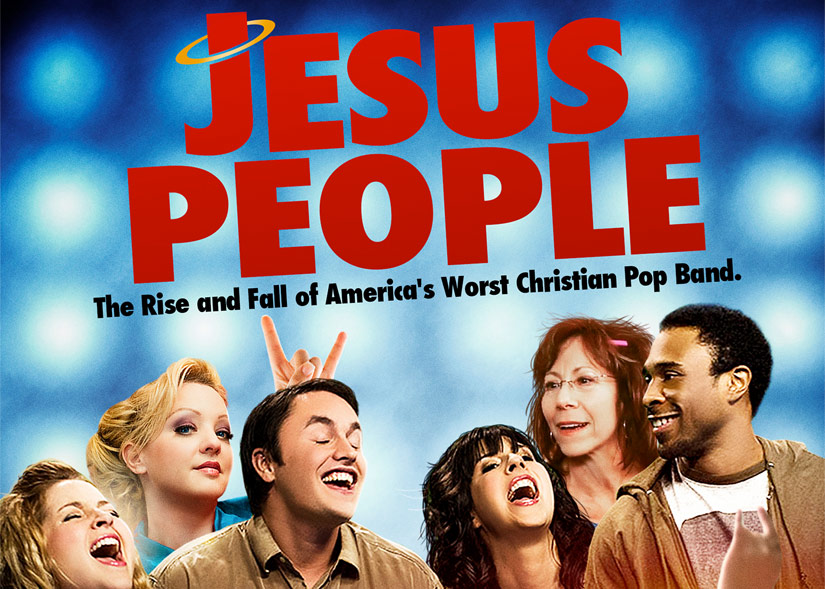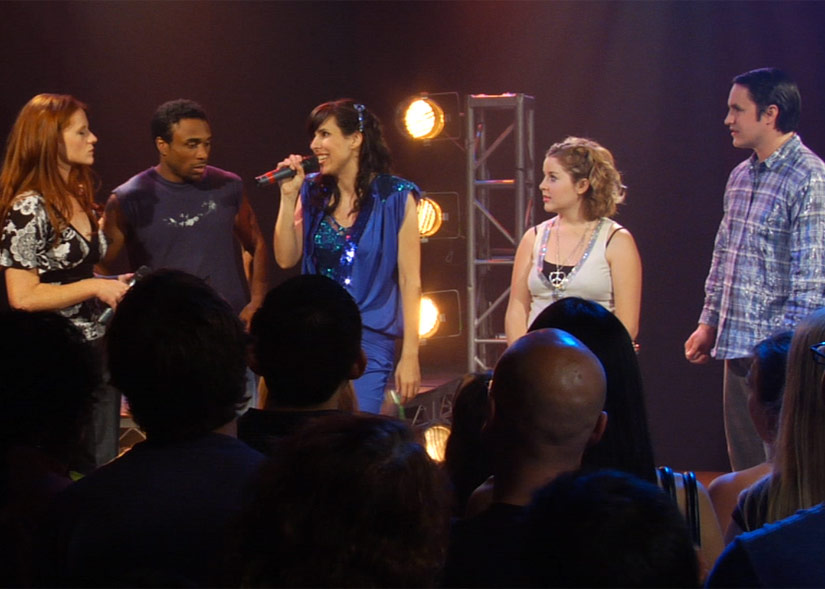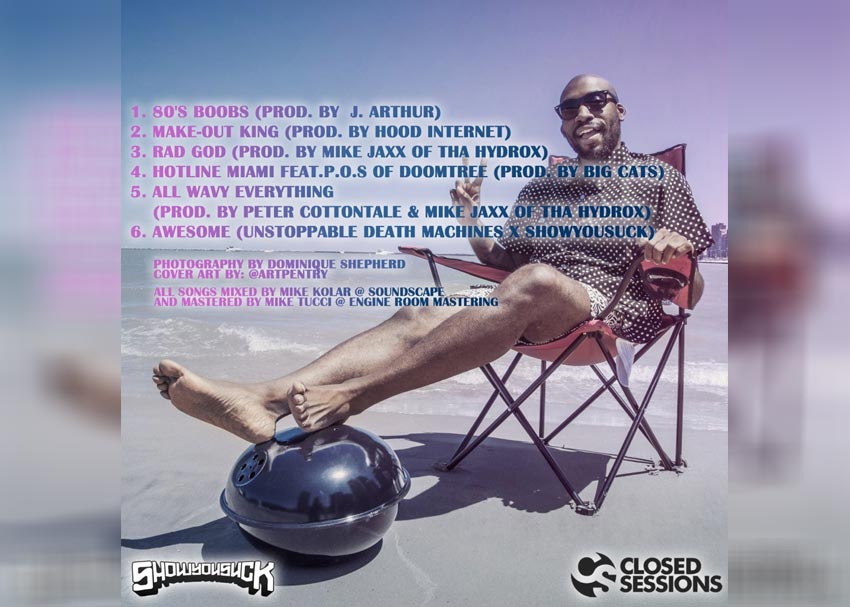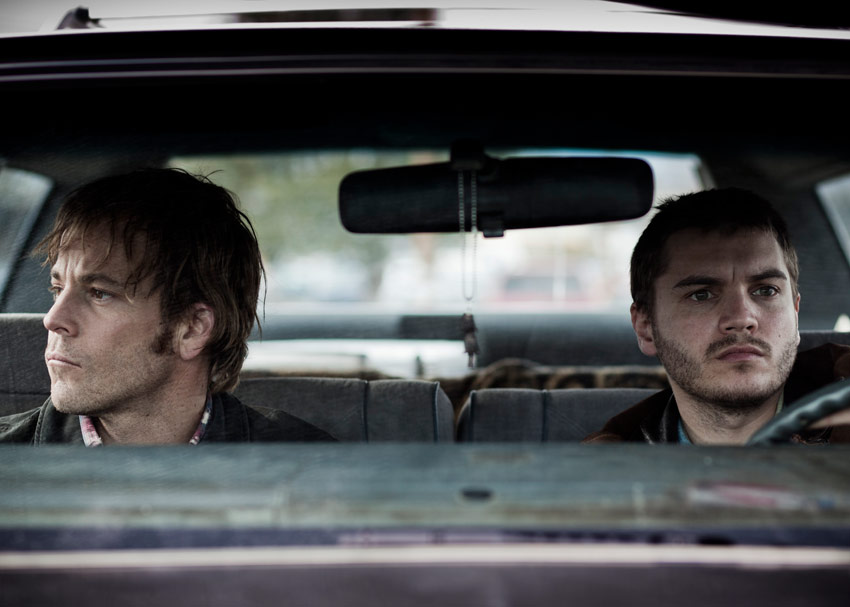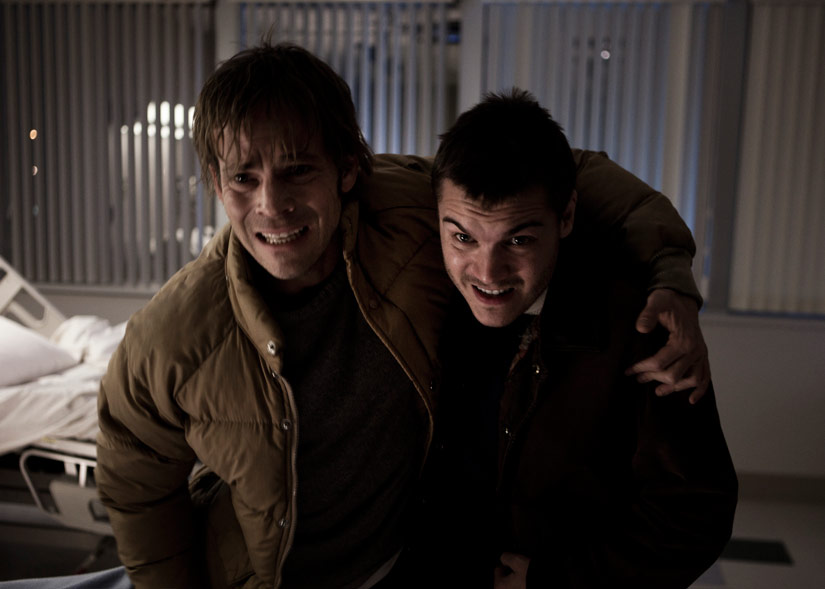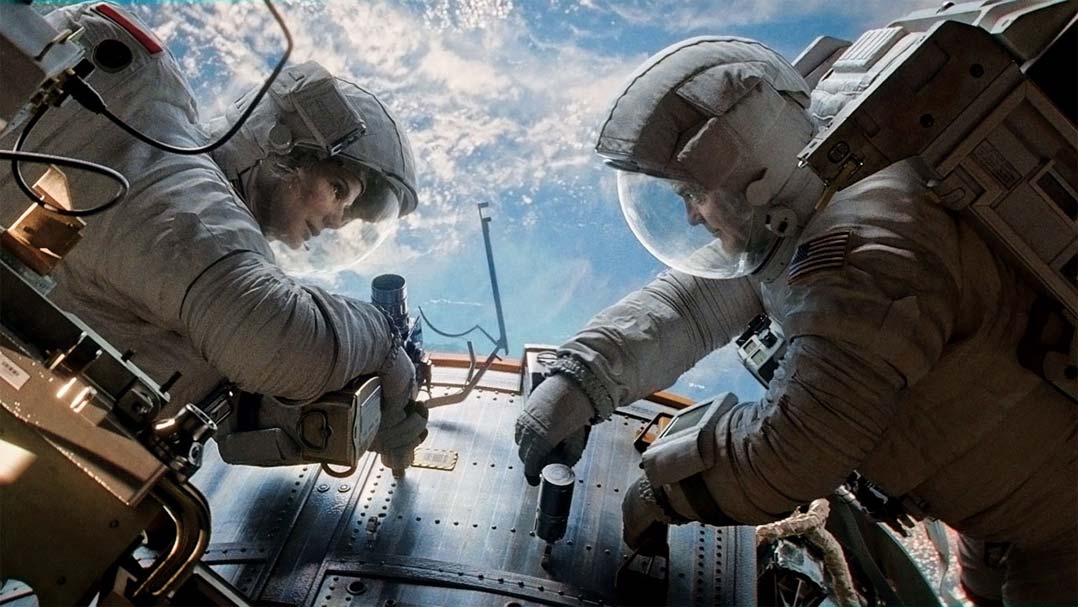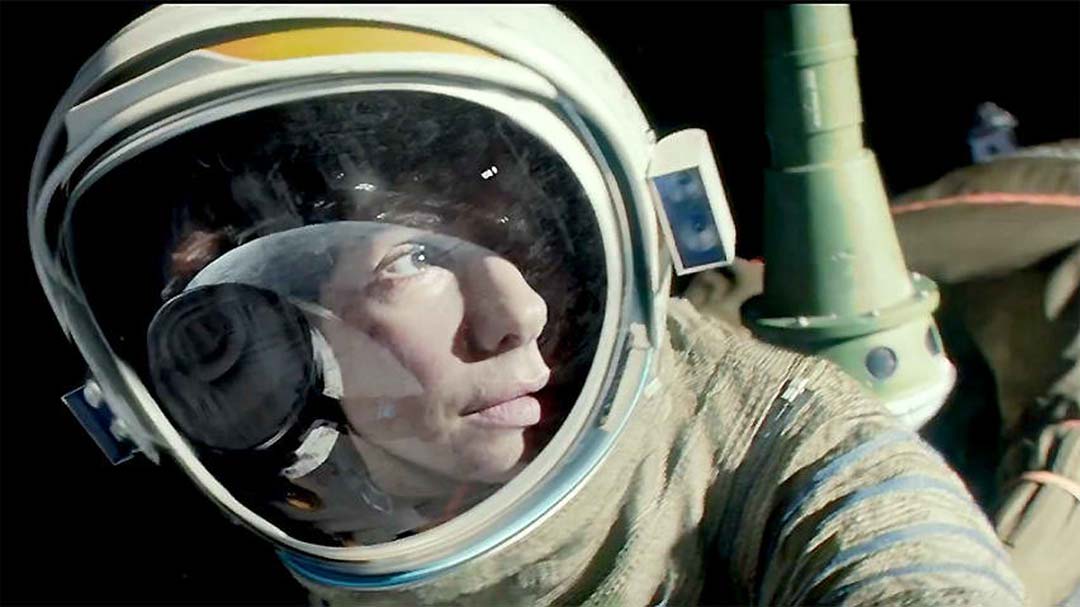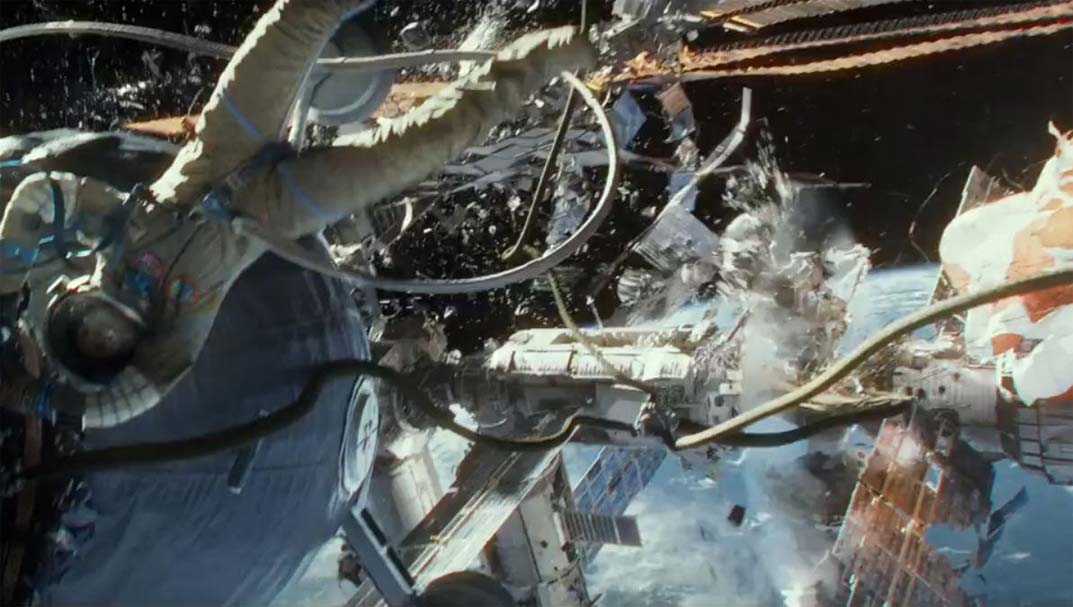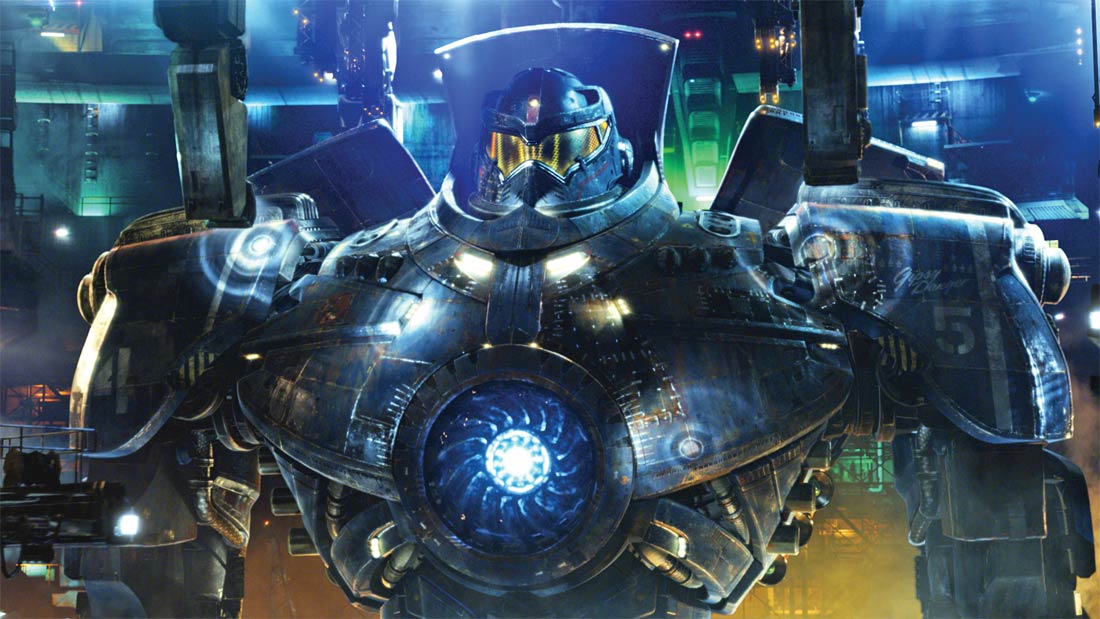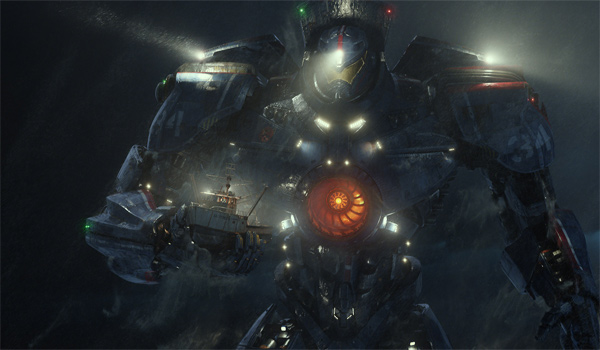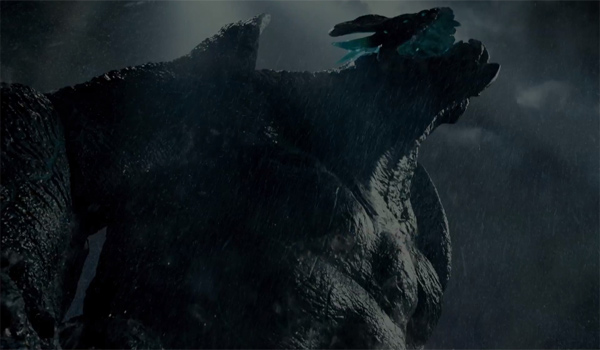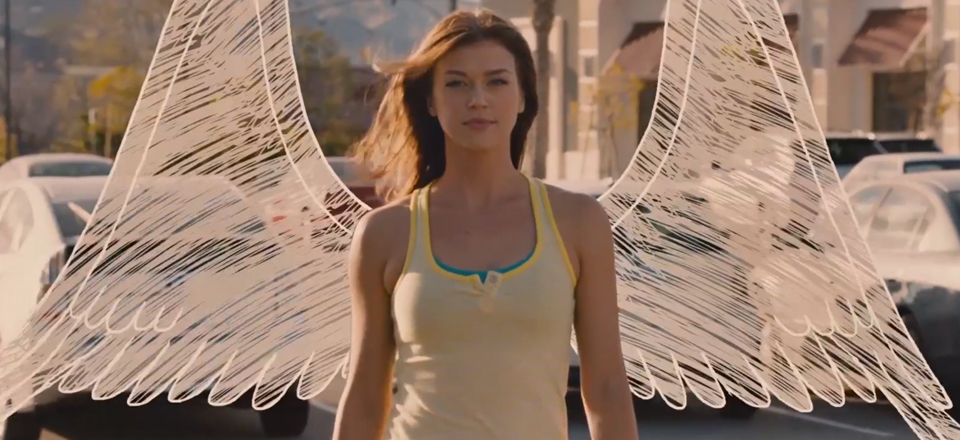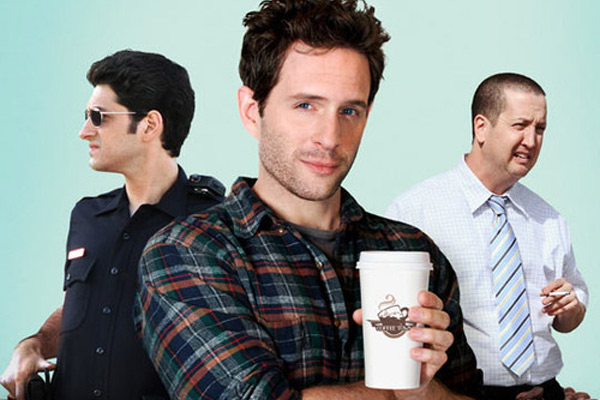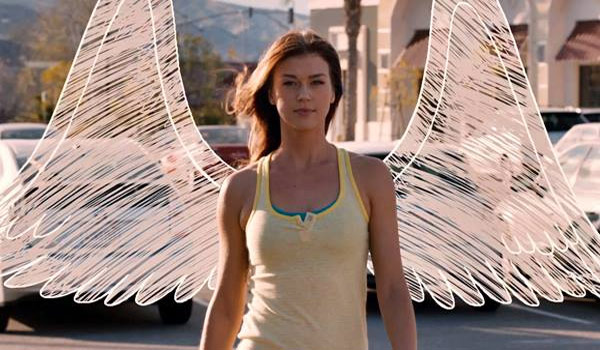[Review] Jesus People
I both love and hate the mockumentary format in film (and TV). Shows like The Office and Parks and Recreation can take the simple concept of a TV crew working as tangible, off-screen characters to capture these characters' intimate moments in a believable way. Of course, the presence of these minor characters can lead to funny moments when characters break the fourth wall to acknowledge the insanity (The Office's Jim being the most popular example).
However, the style of the mockumentary can also end up being a mixed bag, having too much in common with the overused found footage genre. In a way, the mockumentary is to comedies what found footage is to horror - when it works, it's on point, but when it fails, it feels lazy and uninspired. Where does Jesus People fall? Read on and find out.
[vimeo id="82323367"]
Jesus People
Director: Jason Naumann
Rating: N/A
Release Date: April 11, 2014 (limited release)
Fearing that he's losing his son Eli (Chris Fennessy) to the secular world, Pastor Jerry (Joel McCrary) is desperate to re-connect with him before it's too late. However, "too late" may not be late enough after a vague medical diagnosis sounds severe. Pastor Jerry, fearing his death is fast approaching, attempts to reach out to Eli by forming a Christian pop band, Cross My Heart. After tapping former popular Christian singer Gloria Hamming (Edi Patterson), church member Zak Crowning (Damon Pfaff), beauty pageant winner Cara Bosch (Lindsay Stidham), and dedicated youth group teacher Ty Raney (Richard Pierre-Louis), the band records their first single, "Save the World." When the song grows bigger than any of them imagined, it signals the dissolution of the band just as they were growing big.
The slant behind Jesus People is the hilarity and sometimes conflicting existences of Christian bands. On the one hand, they find success in Christian radio, but the limiting scope isn't enough for what they want to achieve. When they release a "secular" remix of the song, it shoots up the Top 40 list, but alienates their Christian base. A lot of the humor comes from this controversy where some of the band members aren't Christian, just playing the part for the means of success. Religion is a touchy subject, especially in the form of a comedy, but Jesus People doesn't lampoon the religion in a negative way, which was pretty surprising, considering what the film's about.
The mockumentary style of shooting also benefits the film's nature. Ty is Jesus People's "Jim," constantly turning to off-screen director Jodi (Nikki Boyer) for assistance or assurance that the banality of some of the group's discussions is, in fact, real. The breaking of the fourth wall, within the context of the documentary, is also a sly way for Pierre-Louis to look directly at the viewer for that same reaction; usually, this would be cheesy and an all-too-easy way of poking fun at the film for a quick laugh, but it works in Jesus People.
The narrative itself isn't all too exciting, never outgrowing past the concept of "Hey, let's film a mockumentary about a Christian pop band," but the novelty of exactly that (a mockumentary about a Christian pop band) is enough to warrant a look at the film. Characters, albeit one-note and shallow, do at least experience a full arc, with no one character outweighing another, both in terms of character development and screen time. The issue, however, is that it's just not that funny. There are moments where you'll chuckle over a cute line or scene, but it never warrants a real laugh out loud reaction.
[RH Review] ShowYouSuck: "Dude Bro"
ShowYouSuck has been one of the more interesting artists in the Chicago landscape for a minute now. Since establishing himself as a witty lyricist and connoisseur of all things "rad" on his One Man Pizza Party trilogy, released throughout 2011-13, Show has carved out a niche unto himself with a character and personality to match. Dude Bro, released today, is the culmination of a long road of experimentation and progression that pulls from all sides of what makes up the complex and fun-loving LOD/Treated Crew affiliate.
Linking up with Chicago outfit Closed Sessions for his latest project, Show recorded a majority of the album under the watchful eyes of Mike Kolar at Soundscape Studios, which has become habit as of late. The continued work and personal relationship between Closed Sessions CEO Alex "RTC" Fruchter, Kolar and ShowYouSuck shows on Dude Bro, as an overall aesthetic reigns supreme in a tightly-knit, entertainingly different approach.
The lead single off the project, "80s Boobs" is wholly ShowYouSuck through and through. From the artist that brought you "Viva La Chon Chon" and "Mom Jeans" is the perfect reverie back to the days of "Fast Times at Ridgemont High" as Show reminisces over the intricacies of the era's breasts, rapping: "Double D's on my sofa/Double A's in my remote/Weird Science on VHS but my goddamn VCR broke." J. Arthur of Chicago duo theWHOevers handles the duties on the beat, employing a synth-heavy backing that calls to mind the eighties perfectly to add a fitting platform from which to let Show explain the subject matter further.
Perhaps the most appropriate song ShowYouSuck has ever made is also the final track on the album, "Awesome" featuring punk rock duo Unstoppable Death Machines. Anyone who's been to a ShowYouSuck show will testify to the fact that his performances more clearly resemble a punk rock show, complete with moshpits and stage dives, so the two acts complement each other deftly. As a kid who grew up going to Metal shows in and around Chicago, Show is completely in his element, using his performance call and response "Show is so awesome-Show You Suck" as the chorus over the wild, intense backing from Mike and Billy Tucci that make up Unstoppable Death Machine.
Top to bottom, Dude Bro is fully and totally the artist that is Clinton Sandifer, ShowYouSuck. Show is a narcissistic rapper; his songs are just about things he enjoys. For a less interesting person, this could pose an issue, but for the fun-loving lyrical Jedi that he is, Show has found just the right amount of all the aspects that make up who he is and found a way to transfer that perfectly to an album. For an artist that wears his emotions on his sleeve as anyone tracking his Twitter account last night as Dude Bro dropped can attest to, this release means something, and may just be the kind of polished, well put together project with a solid backing that could once and for all vault Clinton over the proverbial wall to the big time. ShowYouSuck is on iTunes, buy Dude Bro here for only $4.99. You can also stream Dude Bro in its entirety below.
Score: ![]()
![]()
![]()
![]()
![]()
![]()
![]()
![]()
![]() 8.5 out of 10
8.5 out of 10
[RH Review] The Motel Life
What do you do when the world is constantly working against you? Do you simply give up and succumb to the inevitable defeat, or do you keep trudging along, hoping and praying for a break? Will it be too late if/when that break ever happens? Alan and Gabe Polsky's film adaptation of musician/writer Wily Vlautin's novel, The Motel Life, addresses exactly this conundrum. However, as compelling as the ideal behind the film is, it's the execution that truly matters.
Is The Motel Life an interesting look at what two brothers do in the face of defeat, or is it predictable and uninspired?
[youtube id="JE-O0H8pjhc" mode="normal" align="center"]
The Motel Life
Directors: Alan Polsky and Gabe Polsky
Rating: R
Release Date: November 8, 2013
Frank (Emile Hirsch) and Jerry Lee (Stephen Dorff) are two close brothers that have never left each other's side after their Mom died when the two were teenagers. Rather than risk being separated by being sent to different foster homes, the two leave school for a life on the road. However, a tragic accident strikes as Jerry Lee loses the lower half of his right leg while attempting to hop a train. Years later, the two live in a motel in Reno, NV, working random jobs to make money.
When Jerry Lee accidentally kills a teenage boy in a hit-and-run, his already existent feelings of worthlessness become even more magnified, weighing heavily down upon him. However, despite running off to avoid any police investigations, he returns to Reno. Meanwhile, Frank, already the burdened with the task of being the responsible brother, begins to succumb to his inherent depression, exacerbated by longings for his ex-girlfriend (Dakota Fanning) and a growing alcohol dependency. However, just when good fortune begins to turn for the Lee boys (thanks to the Buster Douglas-Mike Tyson fight, no less) and when Frank's personal situation begins to turn the corner, the brothers are forced to confront a turn of events that proves to be much darker than anything they've already faced.
Mixed into the film are various animated scenes narrated by Frank and implied to be based off of Jerry Lee's drawings (done by artist Mike Smith). These scenes fit contextually as stories Frank would tell Jerry Lee for comfort, but also add an extra layer to an otherwise straight-and-narrow indie film. The mixed media removes the audience out of the moment, yet is balanced by the entertaining and oftentimes raunchy and pornographic , further adding to the entertainment value.
Despite how dark and innately depressing the film's narrative can be, the chemistry between Hirsch and Dorff lightens the edges a bit. Sure enough, the highlights of the film are the performances delivered by the two leads. Whereas most films exploring sibling relationships would create some type of conflict between them, The Motel Life instead keeps the brotherly love central to the film.
Hirsch has played roles where the film itself overshadows his performances (Speed Racer, Killer Joe) and where his performance truly elevates the film into becoming something special (Into the Wild). His turn as Frank Lee falls between the two extremes, which is very much welcome. You can't resist yearning to help Frank as he slowly becomes a victim to his growing alcohol abuse. Alongside Hirsch is Dorff's Jerry Lee, who spends the film fraught with guilt over the teenager's accidental murder, but also the guilt of his lack of self-worth holding Frank back. The duality of Jerry Lee's character as both Frank's comedic foil, but also the most suffering character is finely portrayed by Dorff's performance.
The great performances from Hirsch and Dorff are definitely a highlight of an above-average film. The plot can get a bit messy, especially with the subplot involving Frank attaining money (despite the specific boxing scene being otherwise entertaining), and the aforementioned animated scenes are fun distractions, but distractions nonetheless. However, The Motel Life has the potential to attract and appeal to the right audiences. The duality between internal and external conflicts of the plot paired with memorable performances from Hirsch and Dorff will be enough for most, but the predictable third act and spotty narrative holes might turn others away.
Score: ![]()
![]()
![]()
![]()
![]()
![]()
![]() 6.5 out of 10
6.5 out of 10
[RH Review] of Montreal @ Lincoln Hall 10/30
The rain didn't stop anyone from making it over to the sold out show at Lincoln Hall last night to see of Montreal turn it out Halloween Eve-style, with the grooviest set I've seen in a while. Lincoln Hall was packed to the brim with fans decked out in costumes and ready to dance, hoping to hear their favorites and some new tracks from of Montreal's latest record, Lousy With Sylvianbriar, for the first time.
The show kicked off with a man dressed Nacho Libre giving an appropriately creepy and energized introduction for Kevin Barnes. Barnes hit the stage in a vintage 60s two-piece pant suit, thanking everyone for coming and jumping into "Triumph Of Disintegration," followed by the first track off the new record "Fugitive Air." The band was accompanied by stage dancers who came out in full white body suits, catching psychedelic projections on their bodies, and eventually diving into the crowd, surfing their way to the back of the venue. They brought the whacky down a bit for "Raindrop In My Skull," another new track from Lousy, sung by the beautiful Rebecca Cash. Her spooky sensuous voice entranced the crowd adding a mysterious and enticing vibe to the set. But my favorite part was probably the fact that they played a ton of songs off Hissing Fauna, Are You The Destroyer including "Suffer For Fashion," "Heimdalsgate like a Promethean Curse," and "Gronlandic Exit," with an a capella introduction from the crowd singing the funky synth part under Barnes's vocals.
The show was a perfect way to start off the Halloween weekend, but the tour continues. Don't miss your chance to see of Montreal live, and check out their new music video for "Fugitive Air."
[youtube id="HXA5-w4RuEE" mode="normal" align="center"]

[RH Review] Gravity
3D in film is a gimmick. Who cares if a popcorn or booger looks like it's hurtling towards you? Because of its unnecessary nature, I've spent years actively hating and avoiding watching films in 3D. As I walked towards the theater for my screening of Gravity a few weeks ago, I was dismayed when I realized it would be shown in 3D. I let out an audible groan, I alerted my friend of the unfortunate circumstance facing us, and I gritted my teeth as the film began.
In that moment, I was sure that my protestations against 3D would be justified, enhanced even. As the credits rolled, however, I realized something: As Hollywood slowly realizes how unnecessary a gimmick 3D is and begins to move away from the fad, Gravity stands at the top as a prime example showcasing just how powerful and truly innovative the format can be. If you're too lazy to read the rest of my review, know this: Watch Gravity on a 3D IMAX screen, no ifs, ands, or buts.
http://youtu.be/H4coTNta-YA
Gravity
Director: Alfonso Cuaron
Rating: PG-13
Release Date: October 4, 2013
Dr. Ryan Stone (Sandra Bullock) is a biomedical engineer on her first trip to space to fix malfunctioning equipment on a sattelite. Her captain, Matt Kowalski (George Clooney), is an experienced astronaut on his final voyage in space. As he floats aimlessly in space to break a spacewalking record, Stone's inability to adjust to the lack of gravity leaves her nauseous and unable to work effectively. Despite the idyllic nature of space's nothingness, the crew is alerted to debris floating in their direction as the product of a Russian missile destroying space stations. Suddenly, Stone and Kowalski find themselves in danger as the shrapnel makes contact with their ship, killing the entire crew and leaving Stone hurtling through space.
As she begins to reflect on her life, Kowalski attempts to keep her calm as he rescues her. However, Stone's oxygen supply is dangerously low, and Kowalski's jet pack begins to lose thrust. When all seems lost, they miraculously make it back to a space station... but the threat is far from over.
At first glance, Gravity might seem limited in conflict; however, once the film begins, you realize that the inherent conflict of being alone in space is what drives the entire film. The entire film takes place within the confines of the first conflict until its resolution - that is to say that there are no flashbacks created as an attempt to contextualize the story or to create a false sense of empathy for Dr. Stone. All of the pertinent background information is shared through passing comments shared in conversations between Stone and Kowalski.
Furthermore, it's refreshing to have a film take place entirely in space with no aliens whatsoever. Instead, the main focus, as it should be, is solely on Dr. Stone and her attempt to return to Earth. By focusing on Bullock with no distractions (background ploys, shallow attempts at creating empathy, etc.) beyond the conflict at hand (i.e. (wo)Man vs. Nature (space)), Gravity is both a psychological thriller and a character study that exemplifies just how frightening it can be to be lost in space... as if we needed a film to understand the fear.
Alfonso Cuaron's known for his direction and focus on exceptional cinematography, and it shows in spades in Gravity. Despite the film being shot almost exclusively on a green screen, the camerawork in this film is spectacular. Regular Cuaron collaborator Emmanuel Lubezki's (Children of Men, The Tree of Life) camerawork plays just as much of an important role in the film as Bullock does. After all, this is the man who won a BAFTA for Cinematography in Children of Men. Don't let the heavy use of CGI fool you: Gravity is breathtaking in its cinematography.
This is supported by the aforementioned exceptional use of 3D. Given the nature of space where the basic concept of direction is essentially deemed useless, there's no telling which way is up. With every rotation of a satellite, every roll Dr. Stone takes in her free fall, every piece of scattered debris is exacerbated and accentuated by the extra depth that 3D allows. Never before have I contemplated what an extra dimension could do for a film.
What's used and exploited as a gimmick and cash cow by lesser directors has been used to actually bring purposeful depth to Gravity, both figuratively and literally. The entirety of space simply would not have been the same had I seen Gravity on a normal screen. You'll want to shell out the extra $10 for 3D, possibly even more on an IMAX screen, because every inch, every centimeter, every pixel of the screen plays an important role in this film. Who would have known that mise en scene would be so important for a film where complete emptiness takes up the majority of the screen?
Gravity is literally breathtaking. As Dr. Stone desperately gasped for air as her oxygen tank quickly emptied out, I, too, took deep breaths alongside her. Was it because I truly felt for her? Was it because the 3D made me feel as if she were right in front of me, just out of arm's reach? Was it because of the theater's sound system emphasizing every small sound effect? Perhaps all of this played a role, yet it's because of everything I've mentioned up to this point that I urge every single one of you to watch Gravity. Films like this are the reasons why theaters exist, why Hollywood is the titan of industry that it is, why people like me spend hours of our lives writing and analyzing every second of every film we have ever seen and will ever see.
I truly believe 3D films will fade away by the end of 2014. If so, let Gravity be the medium's crowning achievement. If, for some reason, 3D overstays its welcome (as if it hasn't already), let Gravity be the film that demonstrated just how powerful and awe-inspiring the format truly can be.
Score: 9 out of 10
[RH Review] Pacific Rim
Kaiju films are kind of a niche genre. While everybody has a passing acknowledgment of Godzilla films and the like, they're not as immediately accepted in mainstream culture. Sure, there are cult followings and small subcultures that embrace and adore the inherent geekiness of watching a man dressed in a latex monster suit trample across a model town, but they're not as easily accepted as, say... superhero films. Attempts have been made over the years, with two of my recent favorites being Cloverfield and Super 8, but they just haven't clicked.
My theory is there's a missing element, a level of wonderment that's lost amongst the scenes of total destruction and chaos. Super 8 attempted to capture that innocence and entertainment, but was muddied by government wrangling and politicking (as well as trying a tad too hard in creating a pastiche of past Steven Spielberg films). Pacific Rim is director Guillermo del Toro's (Pan's Labyrinth) largest film to date, both in budget and ambition; can he do with monster movies what X-Men did with the superhero genre?
Pacific Rim
Director: Guillermo del Toro
Rating: PG-13
Release Date: July 12, 2013
Kaiju, Japanese for "giant monster," have arisen from the Pacific Rim wreaking havoc across the world, resulting in a united world war against the common threat. Initial attacks proved fruitless, leading to the human forces to create large robots named "Jaegers." However, they proved to be too unstable for one person to control, so multiple-manned machines were created. Each pilot is subjected to linking their minds with one another in a process called "drifting," allowing them to work seamlessly not only with one another, but with the machine as well.
While the Jaegers were enough to fight off the Kaiju, they continued to come back with adapted strategies. With government support dwindling and the Kaiju attacks rising, one final push is made by Marshal Stacker Pentecost (Idris Elba) who employs the help from an ex-Jaeger pilot, Raleigh Becket (Charlie Hunnam), who himself has been struggling with survivor's guilt for the previous five years. With the aid of a rookie Jaeger pilot, Mako Mori (Rinko Kikuchi), it's up to Raleigh and a small number of Jaeger pilots to help save the world from the Kaiju threat.
One of the most obvious things I noticed about Pacific Rim is the color palette. For a movie that's somewhat surrounded by dread and despair, it's brightly-colored and not muddled with a hazy, grayscale hue. Furthermore, the film isn't bogged down by the aforementioned politicking that takes away from the sheer entertainment of watching giant robots fight monsters. Sure, there's a military setting, but there isn't a large military focus in the same way Transformers, for example, overshadowed the actual Transformers themselves.
Furthermore, Pacific Rim is kept thematically light. I was hoping for something a bit deeper in terms of themes or something to analyze deeply, but after the film ended, I realized that it wasn't really needed. There's some mind fodder with the notion of having to connect with another person's emotions, attitude, memories, etc. as part of the drifting process, which could make for a little essay, but nothing too substantial. If you're also looking for a deeper motive for the Kaiju's attacks, you won't find it. And honestly, I like it better this way. del Toro kept the focus on the pilots and Jaegers, and any extra exposition would have thrown off the film's balance. There's still a good plot attached to the film with slight anecdotes/arcs characterizing even the most minor of background characters, as well as a fun subplot revolving around a kaiju-obsessed doctor (Charlie Day) attempting to attain a live kaiju brain from a black market dealer (Ron Perlman).
The lack of heavy-handedness allows the audience to truly cherish the entertainment value of the film. Through every fight scene, I kept thinking about how much fan service del Toro put into them. As I've publicly stated in a multitude of outlets: the robots use boats as swords. If that doesn't trigger a happy reaction in your subconscious, you truly don't know fun. The thing is, del Toro can and has created films that are heavy with the allegory; he simply felt that it didn't fit in with the tone he wanted to accomplish with Pacific Rim. For that, I truly thank him for understanding the inherent entertainment of watching robots fighting monsters.
Pacific Rim was intended by del Toro to be an introduction to the kaiju and robot genres for children and newcomers. In saying that, it definitely has a broader appeal than most other kaiju/robot films; however, it does leave a bit more for those of us who are already familiar with the genre. It's a mixed bag, as I certainly demonstrated earlier. Why I have enjoyed a more psychological/philosophical/existential theme? Of course. Does it fit with del Toro's vision for the film? Of course not.
What Pacific Rim comes down to is whether or not you'll enjoy yourself watching it. Believe me when I say you will. The fight scenes are remarkable and entertaining; there's no other simple joy than watching two large entities fighting one another. del Toro is the type of visionary Hollywood needs right now; he understands what the audience wants and deserves, and does his best to serve them in a way that also fits his vision. Pacific Rim is sheer proof of the type of film he not only enjoys, but feels that the movie audiences would, as well. After all, there are robots using boats as swords. Come on.
Score: 7.5 out of 10
[RH Review] Coffee Town
CollegeHumor has been one of the premiere comedy websites since practically the internet got super popular. Before YouTube, before Twitter, before Facebook, before MySpace, there was CollegeHumor providing some of the best comedic content during the initial internet boom. Almost 15 years after CollegeHumor launched, they've thrown their hat into the film industry with Coffee Town. However, with standards and practices dictating what can and can't be shown in a feature film, will CollegeHumor's brand of comedy translate well into this new frontier?
Coffee Town
Director: Brad Copeland
Rating: N/A
Release Date: July 9, 2013 (VOD)
Affected by the economic downturn that took his comfortable office job, Will (Glenn Howerton) found himself employed as a website manager. However, with the freedom that the job brings comes a lack of human interaction, so Will takes residence at a local coffee shop, the titular Coffee Town. While stationing his workplace at the shop comes with its benefits, including free wi-fi, his friends Chad's (Steve Little) and Gino's (Ben Schwartz) ability to visit him daily, and getting a glimpse of his crush, Becca (Adrianne Palicki). However, all good things come with the bad, such as Will's arch-nemesis/barista Sam (Josh Groban). When a plan is proposed to turn Coffee Town into a bistro, threatening Will's comfortable working conditions, he decides to take drastic measures to prevent change from happening.
Coffee Town is presented as a modern, Office Space-esque comedy that illustrates how our economy has affected business. It doesn't get preachy by any means, but it definitely touches on the human element of being displaced following the recession. Copeland and the cast buoy this with an outlandish, selfish scheme that helps characterize Will and his friends. However, I would have appreciated more of this emotional slant from Will. There are scenes where he opens up to Becca about why he feels so connected to Coffee Town, and that level of depth could have helped shape the film better.
The problem I had with Coffee Town is that it doesn't really take risks. As I alluded to a bit when we posted the first trailer, I hoped the best jokes weren't already shown. Well, as it turns out, they were. CollegeHumor have a tendency to push the envelope, and that's something I wish was utilized more in Coffee Town. Sure, there are a few risque moments, like the hilarious "gay/straight" scene seen in the trailer and a ridiculous fight scene that missed its mark, but I would have liked to seen something more edgy.
Maybe it's because of how talented and funny the cast is. It's Always Sunny in Philadelphia is one of my favorite shows and Ben Schwartz' Jean-Ralphio is a scene stealer whenever he's on Parks and Recreation, so pairing them together came with a lot of expectations that weren't met. It's understandable that CollegeHumor would want to play it safe for their debut film, but I was just expecting something more grandiose, both in scope and hilarity.
Score: 6 out of 10

